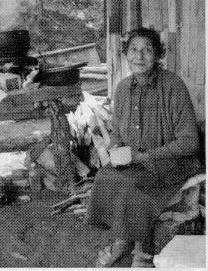The Chimera of Genuine Neutrality
Peace Community in Displacement: Among dreams, a new wish
 The
following is excerpted from EXODO: Boletin sobre
desplazamiento interno en Colombia, Julio-Agosto 1997, No. 5, a
bilingual publication sponsored by GAD, Grupo de Apoyo a
Organizaciones de Desplazados (Support Group for Displaced
Organizations), a coalition of 12 Colombian non-governmental organizations.
The
following is excerpted from EXODO: Boletin sobre
desplazamiento interno en Colombia, Julio-Agosto 1997, No. 5, a
bilingual publication sponsored by GAD, Grupo de Apoyo a
Organizaciones de Desplazados (Support Group for Displaced
Organizations), a coalition of 12 Colombian non-governmental organizations.
On March 23, tired of war, seeking to remember their dead, searching
still for the disappeared and those buried in common graves built by
paramilitaries along the road, and honoring those forcibly exiled,
the town of San Jose de Apartado and its 28 neighborhoods declared
itself a Community of Peace.
The proposal for a Community of Peace, inspired by the Diocese of
Apartado and supported by Justicia y Paz and CINEP, is an attempt to
respond to the cries of the community who suffer systematic
violations of their human rights by the Armed Forces and their
paramilitary groups as well as violations of international
humanitarian law by insurgent groups.
The proposal seeks to promote "an experience of autonomy and
alternative community development based on international human rights
law while confronting the dynamics of the war taking place in the
region. We cannot allow the war to destroy what is left of the social
fabric in the region," commented a church member when describing
the spirit of the proposal.
Uraba is the epicenter of an internal armed conflict that appears to
be heading toward a "war of positions": in other words, the
territorial control garnered by an armed actor implicates the
civilian population in the war, allowing the adversary or
"enemy" to convert civilians into military targets.
Therefore, when territorial and ideological control are perfectly
determined and delineated, the possibilities for neutrality remain
uncertain and civilians are defenseless. Thus, the proposal for a
Community of Peace acquires a deep meaning in the face of war and the
possibilities for social opposition.
The outlook may not be very promising, but even so, the 140 families
currently living in San Jose de Apartado are still resisting.
Already, the NGO Justicia y Paz has filed four complaints with the
President and several of his ministers, but the paramilitary
checkpoint remains in place. Members of the Ministry of the Interior
have verified the complaints, but nothing has happened. When the
Presidential Counselor on Human Rights contacts the local military
battalion, the answer is always the same: "There are no
paramilitaries in the area." The Social Solidarity Network has
given some supplies, but the situation remains the same: hunger,
housing shortages for the newly displaced, unsanitary conditions,
Yellow Fever and serious cases of trauma. Thirty-five people have
been killed since March 23: 33 by paramilitary groups and 2 by
guerrillas. The dead were not killed in combat, but were all civilians.
Top/Arriba 
Index/Indice 
 The
following is excerpted from EXODO: Boletin sobre
desplazamiento interno en Colombia, Julio-Agosto 1997, No. 5, a
bilingual publication sponsored by GAD, Grupo de Apoyo a
Organizaciones de Desplazados (Support Group for Displaced
Organizations), a coalition of 12 Colombian non-governmental organizations.
The
following is excerpted from EXODO: Boletin sobre
desplazamiento interno en Colombia, Julio-Agosto 1997, No. 5, a
bilingual publication sponsored by GAD, Grupo de Apoyo a
Organizaciones de Desplazados (Support Group for Displaced
Organizations), a coalition of 12 Colombian non-governmental organizations.